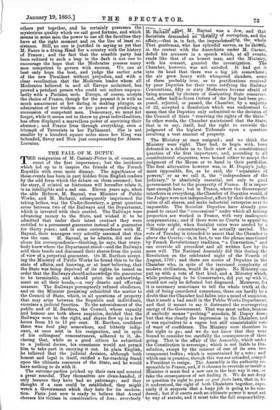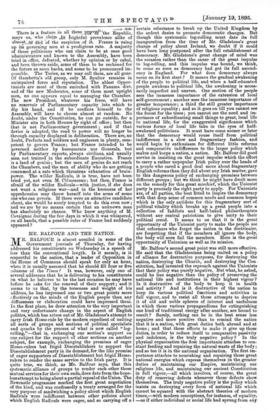THE FALL OF M. D1TP1TY. T HE resignation of M. Casimir-Mier
is, of course, an event of the first importance ; but the incidents which led up to it inspire the friends of the French Republic with even more dismay. The significance of those events has been in part hidden from English readers by the odd form which the debate on them assumed ; but the story, if related as historians will hereafter relate it, is an intelligible and a sad one. Eleven years ago, when the able Hebrew, M. Raynal, was Minister of Public Works and M. Baihaut, subsequently imprisoned for taking bribes, was the Under-Secretary, a great question arose between two of the Railways and the Department, which is invested with their control. The Railways were advancing money to the State, and wished it to be admitted that under their latest contract they were entitled to a permanent guarantee instead of a guarantee for thirty years ; and in some correspondence with M. Raynal, their managers very adroitly assumed that this was the case. M. Raynal, as he admits, did not dis- abuse his correspondents—thinking, he says, that every- body knew where the Department stood—and the Railways sold their bonds and discussed their shares from the point of view of a perpetual guarantee. On M. Barthou accept- ing the Ministry of Public Works he found this to be the state of affairs, and knowing, or at least believing, that the State was being deprived of its rights, he issued an order that the Railways should acknowledge the guarantee to be terminable, and should print the acknowledg- ment on all their bonds,—a very drastic and effectual measure. The Railways peremptorily refused obedience, and on the Minister persisting submitted the matter to the Council of State, which, in all questions of property that may arise between the Republic and individuals, exercises a judicial function. To the astonishment of the public and of M. Barthou, the Council, whose capacity and honour are both above suspicion, decided that the Railways were in the right, and shares flew up in a few hours from 12 to 15 per cent: M. Barthou, confident there was foul play somewhere, and bitterly indig- nant, at once sent in his resignation, and in spite of his colleagues' remonstrances, adhered to it, de- claring that, while as a good. citizen he submitted to a judicial decree, his conscience would not permit him to take part in carrying it out. In plain English, he believed that the judicial decision, although both honest and legal in itself, ratified a far-reaching fraud upon the ultimate resources of the State, and he would have nothing to do with it. The extreme parties pricked up their ears and scented a great scandal. They themselves are clean-handed, if only because they have had no patronage; and they thought if a case could be established, they might wreck a Government which they hate for its modera- tion. Paris just now is ready to believe that Azra,e1 chooses his victims in consideration of fees : everybody Baihal---aemtkat_ M. Raynal was a Jew, and that Socialists demanded iirlirikliAT of corruption, and the affair,—that is, in fact, the impeachineA09- the whole That gentleman, who has splendid nerves, as he-iih-oVit-L. in the contest with the Anarchists under M. Carnet, defied his accusers in a speech which, at all events, reads like that of an honest man, and the Ministry, with his consent, granted the investigation. The Chamber, however, was not satisfied. It had got it into its head that there was a big job somewhere ; the air grew heavy with whispered slanders, some of them probably true, as to gratifications received by poor Deputies for their votes ratifying the Railway Conventions, fifty or sixty Moderates became afraid of being accused. by electors of dissipating State resources. and, after half-a-dozen Orders of the Day had been pro- posed, rejected, or passed, the Chamber, by a majority of 22, accepted a Resolution which was understood to mean that the Deputies only submitted to the decision of the Council of State "reserving the rights of the State." In other words, the Chamber maintained that the State, that is to say, itself, had the right to override the judgment of the highest Tribunals upon a question involving a vast amount of property.
The Ministry at once resigned ; and we think the Ministry were right. They had, to begin with, been defeated in a debate as to their view of a constitutional question of the first importance, and, according to all constitutional etiquettes, were bound either to accept the judgment of the House or to hand in their portfolios. The first alternative however was, in M. Dupuy's judg- ment impossible, for, as he said, the "separation of powers," or as we call it, the "independence of the judiciary," is absolutely essential, not only to good government but to the prosperity of France. It is impor- tant enough here ; but in France, where the Government interferes in everything, the Chamber of Deputies would, if the Judges were not independent, affect by their debates the value of all shares, and make industrial enterprise next to impossible. The Socialist Deputies have already pro- posed to cancel the " concessions " under which all mining properties are worked in France, with very inadequate compensations ; and if there were no Courts to appeal to, this vote might, when Socialist votes were needed by a "Ministry of concentration," be actually carried. The vote of Tuesday is intended to assert that the Chamber is above the Courts,—is, in fact, to use the phrase sanctioned by French Revolutionary tradition, "a Convention," and can override all precedent and all written Law by its mere will. The National Assembly did this during the Revolution on the celebrated night of the Fourth of August, 1789; and there are scores of Deputies in the Chamber who, in spite of the increased complexity of modern civilisation, would do it again. No Ministry can put up with a vote of that kind, and a Ministry which, while pretending to be Conservative, did put up with it, would not only be defeated but disgraced. Moreover, for it is necessary sometimes to tell the whole truth at th-.: risk of being considered censorious, there can hardly be a doubt that the Chamber bad fallen into a mood of suspicion, that it smelt a bad smell in the Public Works Department, and that it meant to say it distrusted the scavengering energy of the Government. That was most unfair, because if anybody means " probing " scandals, M. Dupuy does ; but that was clearly the impression in the Chamber, and it was equivalent to a vague but still uemistakable vote of want of confidence. The Ministry were therefore in the right to go ; and we do not know that they were bound to consider too carefully the consequences of their going. That is the affair of the Assembly, which undEr the Constitution is sovereign ; which is not liable to Dis- solution, except by the consent of one of its own two component bodies ; which is unrestrained by a veto ; and which can in practice, though this was not intended, compel a President to resign. The Assembly is the authority re- sponsible to France, and, if it chooses to override or insult a Minister it must find a new one in the best way it can, or take the consequences of not finding it. We do not deny or question its right to pass ex post facto laws, that is, be, it understood, the right of both Chambers together, espe- cially if it suspects that a huge job is going to be con- doned; but if it exerts such an ultimate power it must act by way of statute, and it must take the full responsibility. "is- There is a feature in all these.,Mr61-2"-the Republic, mays us, who .claim u le frightful prevalence alike of dlid of the suspicion of it. France is using up its governing men at a prodigious rate. A majority of those politicians who can claim to be at once good administrators and known to the Assembly, have been tried in office, defeated, whether by opinion or by cabal, and been thrown aside, some of them to be reckoned for the future as mere hacks, and some to be pronounced im- possible. The Tories, as we may call them, are all gone. Of Gambetta's old group, only M. Spuller remains in unimpaired force and reputation. The ablest Oppor- tunists are most of them smirched with Panama dirt, and of the new Moderates, some of them most upright men, no one appears equal to managing the Chamber. The new President, whatever his force, will have no reservoir of Parliamentary capacity into which to dip his hand, and if he confines himself to the Assembly, will have to choose almost at random. No doubt, under the Constitution, he can go outside, for a Minister sits in both Houses by right of office ; but then that is not Parliamentary government ; and if that device is adopted, the road to power will no longer be through capacity displayed in deliberation. There are, no doubt, Prefects and soldiers and engineers in plenty, com- petent to govern France; but France intended to be governed neither by bureaucrats nor Generals, but by Parliamentary experts, always civilians, and usually men not trained in the subordinate Executive. France is a land of genius; but the men of genius do not reach the Chambers, and the men of ability who do are getting consumed at a rate which threatens exhaustion of brain- power. The wilder Radicals, it is true, have not been tried yet, not even M. Cl6menceau ; but then, France is afraid of the wilder Radicals—with justice, if she does not want a religious war—and in the keenness of her apprehension may throw herself into the arms of some one who can govern. If there were an attractive candidate about, she would be sorely tempted to do this even now ; and we are by no means certain that an unknown man has absolutely no chance. Who knew anything of M. Cavaignac during the few days in which it was whispered, on all hands, that a possible ruler of France had suddenly appeared ?



































 Previous page
Previous page